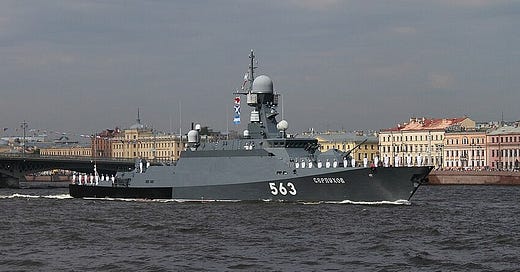Ukrainian Agents Sabotaged a Russian Warship in Kaliningrad, 250 Miles From Ukraine. They Chose the Ship For a Reason.
The 'Buryan-M' corvette may have been able to reinforce the Black Sea Fleet.
Ukraine’s intelligence directorate reportedly triggered a fire aboard the Russian navy’s Buyan-class missile corvette Serpukhov on Sunday, apparently causing enough damage to put the 246-foot warship out of action.
That the Ukrainians have damaged or destroyed another Russian warship isn’t surprising. In the 26 months since Russia widened its war on Ukraine, Kyiv’s drones, missiles and saboteurs have struck more than a dozen of Moscow’s warships.
What seemingly is odd is where the cruise-missile-armed Serpukhov is … and which regional fleet she belongs to. Serpukhov sails with the Baltic Fleet from the Russian exclave of Kaliningrad, between Poland and Lithuania on the Baltic Sea coast.
Kaliningrad is 250 miles from Ukraine.
But the purported raid on Serpukhov makes sense, even though the vessel and her Kalibr cruise missiles aren’t a threat to Ukraine while Serpukhov sails from Kaliningrad.
Serpukhov is a threat to Ukraine because she might be the biggest Russian warship that can reinforce the Black Sea Fleet without passing through the Bosporus Strait, which Turkey controls—and which Turkey has closed to all warships.
There’s an alternate way from the Baltic Sea into the Black Sea for smaller Russian vessels, however. A chain of canals connects the Baltic Sea to the Volga River and the Don River and then the Sea of Azov and the adjacent Black Sea. The Russian inland waterway system is, at its shallowest, eight feet deep.
A Buryan corvette draws—you guessed it—eight feet.
Under the right conditions, and with patience, the Russian navy could reinforce the battered Black Sea Fleet with smaller vessels from other fleets. A Buryan such as Serpukhov probably is the biggest ship can that make the trip.
So in sabotaging Serpukhov in Kaliningrad, hundreds of miles from Ukraine, Kyiv’s agents may have prevented the vessel from eventually joining the war farther south.





